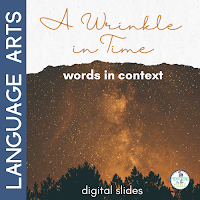"I don't know what that word meant so I just skipped over it."
"Can you pronounce it?
Nope?
Okay, how about any hints as to its meaning? Do you see any context clues? It's okay if you can't pronounce it and it's even okay if you don't know the specific meaning of the word, as long as you get the gist of it. That's key."
Learning how to use clues to determine the meaning of unfamiliar vocabulary seems like it should be pretty easy. I mean, middle-grade authors often provide context clues right in the sentence. But children who don't understand the process often don't know what to look for to help themselves out.
This is why teaching them the specific context clues techniques helps them so much. The more metacognitively aware our students are, the more they assimilate this kind of clue-searching into their daily reading.
Teach them IDEAS for context clues
Here are a few practical tips you can use to help your students crack open word meaning 🔨 using context clues!
🔨 Teach them the importance of the words. I like to explain that the author wrote the words - all of them - for a reason. As readers, it's not our job to pick and choose what words to read and what words to skip. It's our job to read all the words and put meaning to them.
A great activity to help make this point is to use student writing as an example. Grab some samples and read them aloud to the class but just skip over words every now and then. Chances are the meaning will be lost and the class won't quite understand what the writer was trying to say. Plus, the actual writer is likely going to make sure you know that what you read is NOT what they wrote. In fact, if you do this a few times you just might end up with a class that is a little frustrated because you are not reading correctly.
When this happens you have them right where you want them! {Go ahead chuckle to yourself in the background. You've earned it!} This is the perfect time to explain that skipping over words is not a reading strategy - but context clues are.
🔨 Lay the expectation for using context clues. The goal is to help them understand what they are reading, not be able to write a word-for-word dictionary definition. This one thing alone takes away the pressure of those unknown words and makes students much more willing to try.
🔨 Students often skip the word because they don't know what else to do. Give them a system and help them practice using it. I like to use IDEAS to help my students determine word meanings.
I - Are there words in the sentence that will allow you to make an INFERENCE about the word's meaning?
D - Is there an explanation in the surrounding text that provides a DEFINITION?
E - Does the text provide an EXAMPLE that will help you figure out the meaning?
A - Is there an ANTONYM used to contrast the unknown word?
S - Is there a SYNONYM used to compare or explain the unknown word?
Teach your students this acronym and watch them start to make sense of emerging vocabulary.
Grab this FREE interactive notebook page, a one-page context clues reference worksheet that uses IDEAS. Your students can use it as a resource all year long!
Here's a resource that lets them color while they practice.
"This was great practice while changing up the method in which we normally use context clues. Such a good resource for a filler day or a sub day."
"Love this resource! My students really enjoyed this activity. Definitely recommend."
There's also a fun free game I recently found called Context Clues Climber that you might want to try with your students!
Other resources that focus on context clues:






No comments
Post a Comment